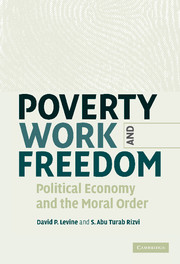5 - Needs, work, and identity
Published online by Cambridge University Press: 22 September 2009
Summary
From moral order to individual right
Subsistence need carries the moral authority of the community. Because it carries this authority, subsistence need has power over the member, the power to determine what the member needs and how that need will be satisfied. The community's power over its members carries with it an obligation to assure, so far as possible, that the member's needs, which are also the community's needs, are satisfied. The member has his or her obligation to do work of a particular kind and, more generally, to perform his or her designated function. And the community has its obligation to assure, so far as possible, the livelihood of its members. In a world where the community no longer carries the moral authority to determine need and how need is satisfied, what replaces the community's moral authority and the system of mutual obligation that goes with it is the ideal of individual right. The growing hegemony of this ideal has the most far-reaching implications for the theory of need and the idea of poverty. To see where the ideal of right takes the theory of need, we will first consider that ideal more closely.
The language of right links conduct to volition. In a moral order, conduct is determined by external imperatives. In a system of individual rights, conduct originates in individual will.
- Type
- Chapter
- Information
- Poverty, Work, and FreedomPolitical Economy and the Moral Order, pp. 55 - 65Publisher: Cambridge University PressPrint publication year: 2005



